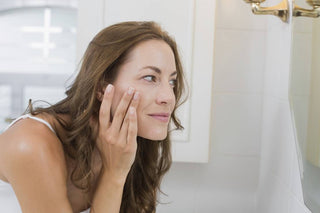by David H. Rahm, M.D.
Q: I use professional skin care products and get anti-aging treatments for my skin but I was wondering what supplements I can take to maintain that healthy glow?
I’m glad to hear that you’re interested in the nutritional aspects of skin care. Like other organs in the body, the health of the skin is dependent on optimal “care and feeding”. So, it makes sense that how well we take care of ourselves on the inside will ultimately have an impact on our outward appearance.
Nutritional supplements play a role in healthy-looking skin in 4 ways: Certain vitamins & minerals support glowing skin and skin health. Phytonutrients help protect the skin from UV-induced damage. Omega-3s lubricate the skin from within plus provide additional UV protection. Probiotics maintain the bacterial balance of the skin, keeping it blemish-free.
Vitamins & Minerals Support Skin Health
As we age, our bodies produce less collagen and elastin. These proteins are associated with healthy, youthful-looking skin so maintaining their production is an integral part of an anti-aging program.
Key nutrients that support these dermal proteins include the carotenoids, vitamin C, vitamin E, the B-complex, copper, selenium and zinc. While these micronutrients are commonly found in fruits and vegetables, most of us do not consume the recommended 5-9 servings a day of these nutritious foods.
Taking a high-quality multi-nutrient formula like VitaMedica’s mineral multivitamin or Anti-Aging Formula provides your body with essential vitamins and minerals to enhance health & wellness while supporting great-looking skin.
Phytonutrients Prevent UV Damage
Phytonutrients, also referred to as phytochemicals (“phyto” meaning “plant”), are the chemical compounds that give fruits, vegetables, grains, nuts, teas, legumes and spices their color.
In addition to their color effects, phytonutrients provide plants with a protective barrier against harmful UV radiation, viruses, bacteria, insects and parasites. The mechanisms of action for many of these plant chemicals include antioxidant, anti-inflammatory, anti-viral and anti-bacterial. When we consume these plant compounds, the health benefits are conferred to us.
5 Phytonutrient Color Groups to Target
Arguably, the most important role of phytonutrients to skin health is their sun protective benefits. Studies have shown that when these compounds are ingested, you can stay out in the sun longer without getting sunburned. These phytochemicals act like an internal sunscreen.
For example, the phytonutrient found in dark green and yellow vegetables is called lutein. This nutrient is deposited in the layers of the dermis and protects the skin from the sun’s harmful rays. Given that photo-damage is the #1 cause of aging, protecting the skin from damaging UV rays is an integral part of an anti-aging skin care program.
If you can't seem to fit in eating plenty of colored produce, then the next best thing is to cover gaps in your diet by taking a supplement like VitaMedica's Phyto-5. This phytonutrient complex is formulated with fruits, vegetables, spices and tea from the 5 major color groups. This supplement is also included in VitaMedica’s Anti-Aging Formula.
Omega-3s Lubricate & Protect
With aging, we often notice that our skin is dryer due to a combination of factors including less oil production and less hydration. Supplementing with an Omega-3 supplement like flax seed oil or a high potency fish oil helps to lubricate the skin internally.
Flax seed oil is a rich source of alpha-linolenic acid, an essential fatty acid (EFA). EFAs perform a number of vital functions in the body, but are particularly important at the cellular level because they are a fundamental component of the membranes of all cells. An adequate supply of EFAs in the diet is essential for healthy-looking skin because skin cells turn over very rapidly.
Best Omega-3 Supplements: What to Look For (Infographic)
Both flax seed oil and fish oil are widely recognized for quelling silent inflammation. However, more recent studies have shown that fish oil plays a protective effect against UV light and may protect against skin cancer. You can enhance the effects of topical sunscreen by taking a fish oil capsule each day.
Probiotics Balance Skin Bacteria
Probiotics are the beneficial bacteria that reside throughout the digestive tract and play a role in digestive health and immune system function.
These beneficial bacteria also normally reside on the skin. Due to the harsh conditions, only a limited number of bacterial species live on the skin. These hardy bugs play a role in the skin’s immune response by inhibiting or killing bad microorganisms. Beneficial bacteria also protect skin barrier function.
When the environment of the skin becomes unbalanced, these bacteria have the potential to cause skin problems. If you have acne, you’re probably aware of a bacterium called P. acnes. An overgrowth of P. acnes is associated with acne development. While topical and oral antibiotics are often prescribed to combat the problem, these medications can cause digestive upset. Antibiotics also upset the delicate balance of microbiota on the skin by killing off beneficial bacteria like S. epidermis.
Probiotics & Acne Control: What You Need to Know
Studies have shown that taking a probiotic supplement can benefit the skin in many ways. For example, in young adults with moderate acne, taking a probiotic supplement improved acne by reducing total lesions and sebum content.
In another recent study researchers found that in women with dry, sensitive skin, after taking a probiotic supplement for women for 24 weeks, transepidermal water loss was reduced and skin barrier function improved.
More recent research has demonstrated that the combination of antioxidants plus probiotics protects the skin from UV damage by activating the skin’s natural immune defenses.
As you can see, nutritional supplements play a key role in healthy functioning of the skin. While supplements can’t replace a healthy diet (featuring fruits, vegetables, lean meats and unsaturated fats), their use can cover gaps in the diet. When combined with professional skin care products, this bi-directional approach ensures that you will have healthy skin for years to come.

